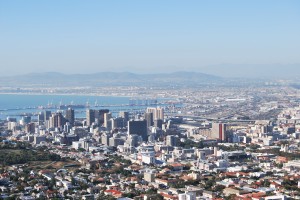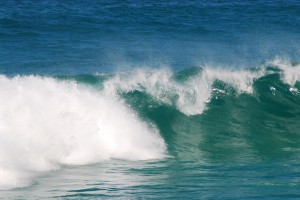This picture very poignantly epitomises for me the dichotomy of our world – on the one hand there is the group who feel nothing about destroying the natural environment and everything in it such as the poachers who hacked off Thandi’s horn and left her for dead and on the other there is the group like this team of veterinarian surgeons who are trying desperately to save it. This is a very visual depiction of Paul Watson’s Third World War. Which side will win is anyone’s guess at this stage but the stakes have never been higher …
Monthly Archives: June 2013
Creating a better future …
 Recently < I had the opportunity to see the documentary "Planet Ocean" - an excellent documentary and really worthwhile viewing. Watching it I was struck by the degree to which some heavily industrialised cities in China, the world's manufacturing centre, have compromised basic human essentials such as air quality for economic growth and development. It brought home to me yet again the maxim by which I live and work: “If we do not create the future we want, we will have to endure the future we get” as I have to ask myself whether this toxic, polluted and dehumanised environment is one which the Chinese and other industrialised nations are intentionally creating for themselves?
Recently < I had the opportunity to see the documentary "Planet Ocean" - an excellent documentary and really worthwhile viewing. Watching it I was struck by the degree to which some heavily industrialised cities in China, the world's manufacturing centre, have compromised basic human essentials such as air quality for economic growth and development. It brought home to me yet again the maxim by which I live and work: “If we do not create the future we want, we will have to endure the future we get” as I have to ask myself whether this toxic, polluted and dehumanised environment is one which the Chinese and other industrialised nations are intentionally creating for themselves?
The Third World War
 < Sparing a thought for the global ocean on World Oceans Day 2013[/caption]Ocean warrior, Paul Watson, believes: "We are now in the midst of a third world war but this time the mission is to save the planet from ourselves". As bleak as this outlook is I have to agree with it as I see our oceanic weapons of mass destruction being factory ships that drag 40km nets that siphon everything from the sea floor; ships that carry whole forests from one part of the globe to another in a glut of one-time consumption; fishing vessels that engage in shark finning that contributes in no way whatsoever to food security, but which feeds human arrogance and greed; and fishing technology that enables fishing fleets to find fish in deeper and deeper waters in our worldwide "race to the bottom".
If future generations are to live on a planet remotely like the one we are living on today, finding food in an ocean that has nourished the human race since the beginning of our time, we have no option but to win this war. It is going to be an epochal battle, the greatest in the history of our species as the stakes are literally the survival of Homo sapiens sapiens.
< Sparing a thought for the global ocean on World Oceans Day 2013[/caption]Ocean warrior, Paul Watson, believes: "We are now in the midst of a third world war but this time the mission is to save the planet from ourselves". As bleak as this outlook is I have to agree with it as I see our oceanic weapons of mass destruction being factory ships that drag 40km nets that siphon everything from the sea floor; ships that carry whole forests from one part of the globe to another in a glut of one-time consumption; fishing vessels that engage in shark finning that contributes in no way whatsoever to food security, but which feeds human arrogance and greed; and fishing technology that enables fishing fleets to find fish in deeper and deeper waters in our worldwide "race to the bottom".
If future generations are to live on a planet remotely like the one we are living on today, finding food in an ocean that has nourished the human race since the beginning of our time, we have no option but to win this war. It is going to be an epochal battle, the greatest in the history of our species as the stakes are literally the survival of Homo sapiens sapiens.
The trouble with bycatch …
An estimated 7 million tonnes of bycatch is being caught and discarded each year.
This is not only a shocking waste of a valuable resource; it is causing dramatic declines in many marine species. And as many bycatch species are top marine predators like sharks, anthropogenic changes to marine ecosystems through overfishing and destructive fishing practices could have severe knock-on effects – because marine ecosystems and food webs are interconnected and extremely complex, the loss of sharks as apex predators may cause dramatic shifts in the ecology of marine ecosystems with unexpected results and far-reaching implications.
Between 73 and 100 million sharks are being caught every year for the growing shark fin trade, with sharks now representing the greatest percentage of threatened marine species on the IUCN’s Red List of Threatened Species. As what happens in the ocean influences what happens on land this could be a catastrophic situation in the making – makes you think doesn’t it?